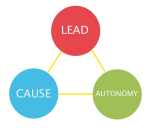 Earlier this week a friend posted an article about “Is it your fault when you are unhappy?” The original blog post is actually from James Adonis, one of Australia’s best-known people-management thinkers.
Earlier this week a friend posted an article about “Is it your fault when you are unhappy?” The original blog post is actually from James Adonis, one of Australia’s best-known people-management thinkers.
James presented two opposite opinions:
- “Your employer is not responsible for your happiness. You are.”
- “It’s not difficult at all for leaders to create happy employees. The only reason it doesn’t happen is if you work for a tool.”
“So, who’s right? Are employees ultimately responsible for the joy they feel at work? Or do their bosses have a moral obligation to make it a priority?
That leaders have a financial obligation is already clear. There are many credible studies demonstrating the benefits associated with happy employees or, more significantly, engaged employees. These reports, for example, outline some of the empirical findings that indicate the positive outcomes include better customer service, higher productivity, enhanced sales and fewer safety accidents.”
James favours the first opinion and continues outlining 4 traits that distinguishes happy employees:
- A desire to work for the simple joy that arises from doing a good job.
- A positive attitude comprising enthusiasm and cheerfulness.
- A conscientious work ethic of hard work and resourcefulness.
- A proactive approach that seeks opportunities to make a contribution.
He further discusses Unhappiness as a result of “waiting” and concludes:
“So, cheers to the leaders who make it a personal mission to create a happy and engaging workplace. But an even more emphatic cheer is in order for the employees who do it themselves.”
My Opinion
I agree happiness is not something leaders can give to people. That is inherently impossible. It is up to you personally what and how you live your life. That’s why I start every day with a smile and enjoy a beautiful Monday.
Although that doesn’t mean leaders can sit back and relax, knowing it’s not their fault if employees are being unhappy. They do have a responsibility to provide 5 things:
- make sure employees do meaningful work
- communicate open, honestly and share information
- ensure employees have autonomy within their responsibilities
- foster innovation, teamwork, and be the chief road block remover
- provide fair compensation and possibilities to grow
If they don’t, people who take responsibility for their happiness will leave and those who wait for happiness to come to them will stay.
To your question, Greg, I don’t think leaders have a moral obligation to create happiness. They work in the same organisation as their team. So, it comes down in my opinion to
- What does the organisation stand for, what’s the purpose? Can I identify with that as an individual.
- What are the values of the organisation and are they demonstarted by the senior managers? Do those match to a large degree with my personal values.
- Do I feel I can make a difference and add value?
If those three questions line up, I can see happiness and meaningful work coming up 🙂



